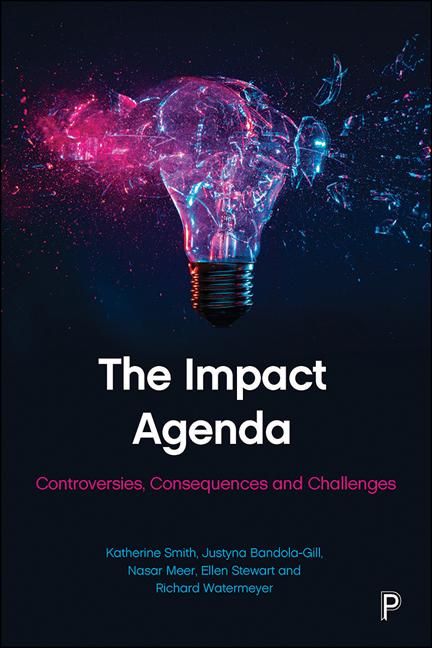Book contents
- Frontmatter
- Contents
- List of figures, tables and boxes
- List of abbreviations
- Notes on authors
- Acknowledgements
- 1 Introduction: Critical Reflections on Research Impact
- 2 The Rise of Research Impact
- 3 Debating the UK Impact Agenda
- 4 Do Experiences and Perceptions of Research Impact Vary by Discipline?
- 5 Impact on whom? Contrasting Research Impact with Public Engagement
- 6 Public Intellectualism and the Impact Agenda: International Perspectives
- 7 Academic Life in the Impact Vanguard: The View from Knowledge Exchange Organisations
- 8 Looking Back: Evolving Public Health Perspectives on Research Impact
- 9 Telling Tales of Impact: As Seen Through the Eyes of User Assessors
- 10 Conclusion: What Would an Evidence-Informed Impact Agenda Involve?
- References
- Index
1 - Introduction: Critical Reflections on Research Impact
Published online by Cambridge University Press: 23 February 2021
- Frontmatter
- Contents
- List of figures, tables and boxes
- List of abbreviations
- Notes on authors
- Acknowledgements
- 1 Introduction: Critical Reflections on Research Impact
- 2 The Rise of Research Impact
- 3 Debating the UK Impact Agenda
- 4 Do Experiences and Perceptions of Research Impact Vary by Discipline?
- 5 Impact on whom? Contrasting Research Impact with Public Engagement
- 6 Public Intellectualism and the Impact Agenda: International Perspectives
- 7 Academic Life in the Impact Vanguard: The View from Knowledge Exchange Organisations
- 8 Looking Back: Evolving Public Health Perspectives on Research Impact
- 9 Telling Tales of Impact: As Seen Through the Eyes of User Assessors
- 10 Conclusion: What Would an Evidence-Informed Impact Agenda Involve?
- References
- Index
Summary
One of the most significant changes to have taken place during our collective time working at UK universities has been the rise of the ‘impact agenda’. Fifteen years ago, few academics had heard of, or were using, the term ‘research impact’. Back then, the contribution of academic work beyond universities was often only of concern to applied disciplines or to individual academics with an inclination towards achieving external engagement and influence. Institutional support for undertaking externally facing work was variable and funding opportunities generally limited. In that context, external engagement and impact were rarely core to academic job descriptions or promotion criteria.
All of this has changed. Working as an academic in UK universities today means that expectations and opportunities to engage with external audiences are higher, and more widespread, than they have ever previously been. Multiple external funding schemes relating to knowledge exchange activities, public engagement and research impact have emerged, and most of the large grant schemes require applicants to provide detailed information about the likely nonacademic beneficiaries, the likely impacts and/or public engagement plans. Most UK universities have introduced internal mechanisms to support research impact, including internal funding opportunities (the extent to which these initiatives can narrow the scope of engagement as part of strategic efforts to meet new performance measures is an issue we consider in this book). Many UK universities have also invested in new roles and centres that focus specifically on knowledge exchange and impact, with a view to both achieving grant income and performing well in the Research Excellence Framework (REF), which informs core research funding allocations to UK universities and which includes a focus on research impact assessment. Indeed, there now exists something of an ‘impact industry’ in the UK. The implications of this agenda affect not only research income but also prestige (Williams and Grant, 2018). It is increasingly hard to imagine university managers conceiving of permanent academic posts that do not include some expectations of outward-facing work, in the pursuit of both grant income and highly sought-after REF impact case studies.
For academics with a commitment to effecting ‘real-world’ change, and working collaboratively with members of the public, policymakers, activists, businesses or practitioners, some of these changes feel very welcome.
- Type
- Chapter
- Information
- The Impact AgendaControversies, Consequences and Challenges, pp. 1 - 12Publisher: Bristol University PressPrint publication year: 2020



